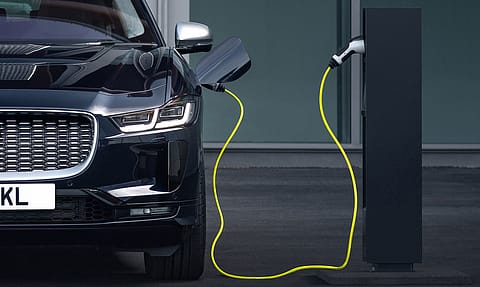Bharat Electronics To Provide Lithium-ion Batteries to Triton EV worth ₹8,060 crore; Stocks surge 3%
The battery packs are to be delivered in 24 months commencing from January 2023.

Shares of state-run Bharat Electronics Limited surged as much as 2.83% to hit an intra-day high of ₹109.15 after the company received a letter of intent from the US-based Triton Electric Vehicle India for the supply of 300 KW Li-Ion Battery Packs for its Semi-truck project in India at an estimated value of Rs. 8,060 crores. The battery packs are to be delivered in 24 months commencing from January 2023.
“The Purchase Order for first-off quantity with a hundred per cent advance payment has been handed over to BEL by Triton. BEL will deliver the first-off quantity by November 2022. The battery packs will be manufactured at the Pune unit of BEL,” the company said in a statement.
Bharat Electronics, which is a PSU under the ministry of defence has also signed a memorandum of understanding (MoU) with Triton EV for the manufacture of Hydrogen Fuel cells with an aim to meet the demand for clean energy solutions and for the adoption of clean energy fuels for applications in transport and energy storage amongst others.
Notably, Triton Electric Vehicle has recently set up its R&D centre and manufacturing facility in India and has forayed into the manufacturing of hydrogen run Two-Wheelers, Three-Wheelers and Buses
The development is in line with the government’s mission of making India a manufacturing hub of EV cells.
India’s PLI scheme for lithium-ion battery manufacturing
Last year, the government introduced a production-linked incentive (PLI) scheme worth ₹18,000 crore for EV manufacturers in order to manufacture, export and store of lithium-ion cells, amidst global semi-conductor shortages. At present, India imports 70% of its lithium-ion battery demand from China and Hong Kong.
Recommended Stories
Under the PLI scheme, electric two-wheeler manufacturer Ola electric has been allocated 20GWh capacity for developing lithium-ion battery cells in India. Apart from that, the country’s leading two-wheeler manufacturer Hero Motocorp has partnered with Taiwanese firm Gogoro to scale up EV manufacturing and introduce electric battery-swapping infrastructure in India.
A report by management consulting firm Arthus D Little states that in order to meet the domestic lithium-ion batteries demand, India needs an investment of ₹64,000 crore. India’s current battery demand stands at 3GWh, which is expected to grow to 20GWh by 2026 and 70GWh by 2030.